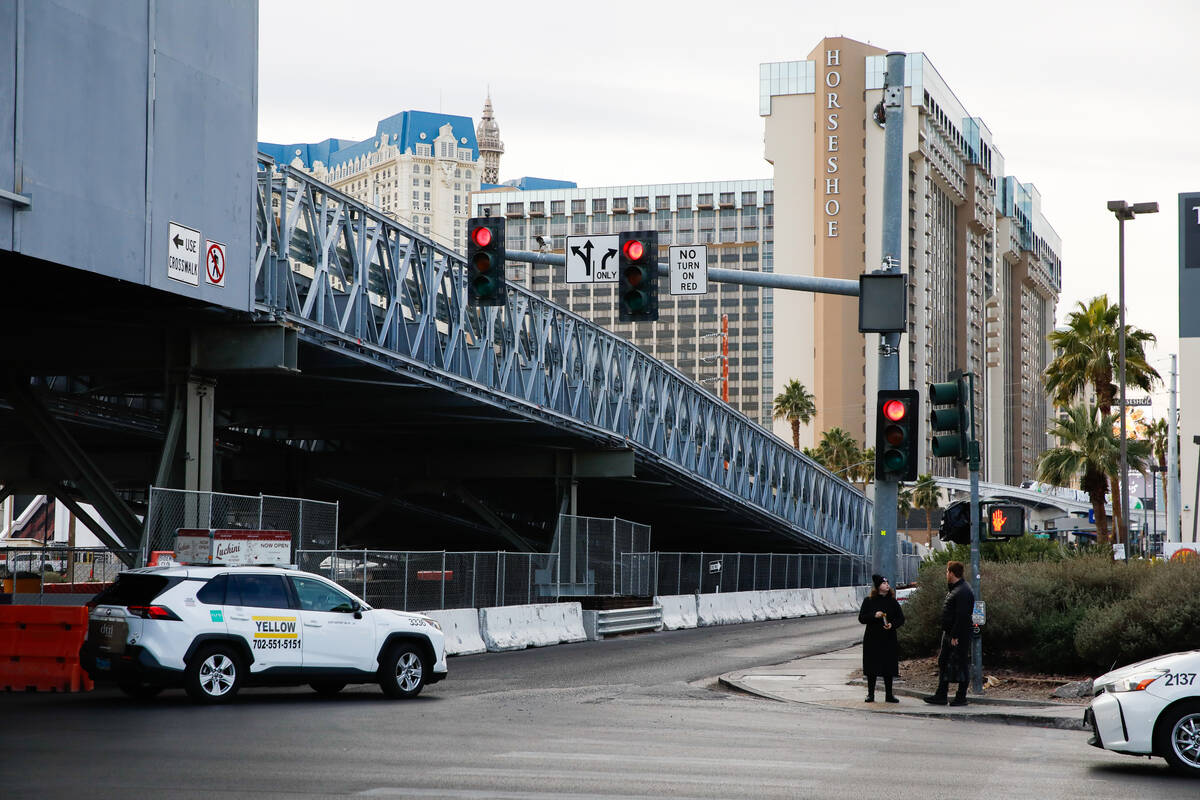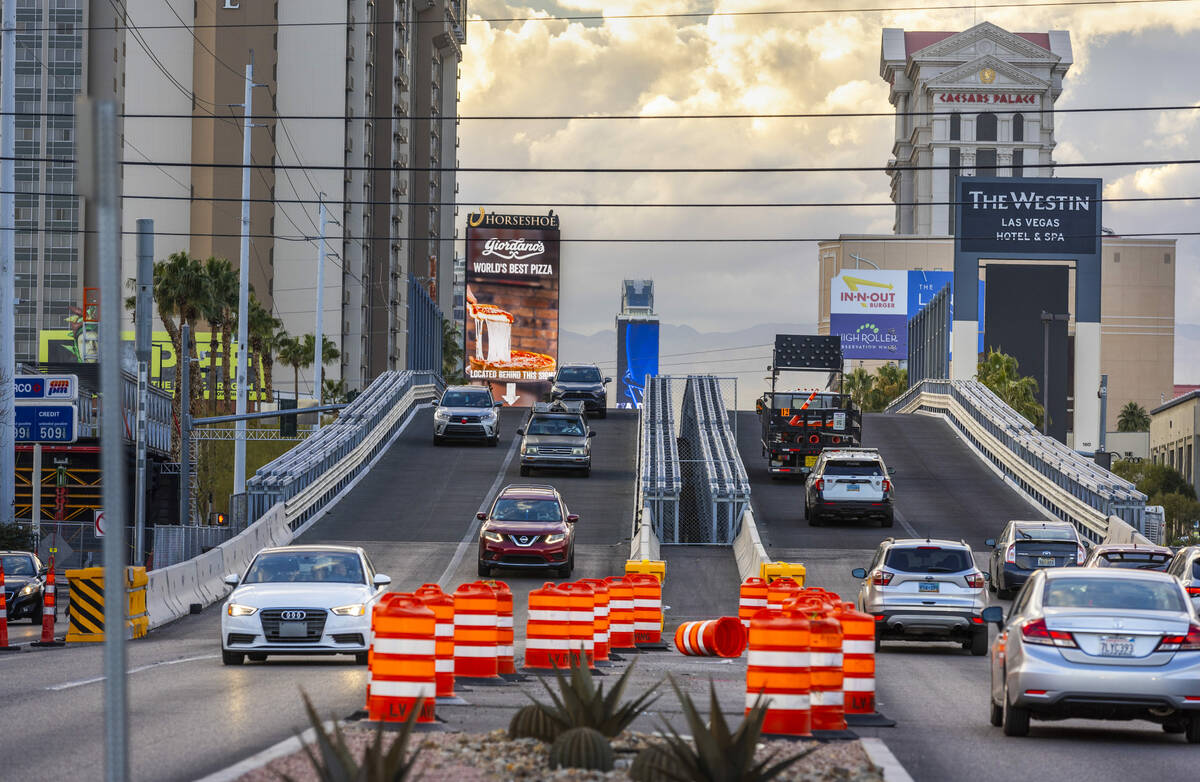How should local small businesses affected by F1 be compensated?
When Lisa Mayo-DeRiso, representing nine local businesses, addressed the Las Vegas Convention and Visitors Authority this month with concerns about losses suffered during the lead-up to the Formula One race in November, she had two big asks.
One, she wanted a 760-foot temporary bridge on Flamingo Road built over Koval Lane to be removed. Two, she wanted a fund established to compensate businesses that lost millions of dollars because construction of the 3.8-mile race course blocked restaurants, convenience stores and gasoline stations in the vicinity of Koval Lane, Flamingo Road and Harmon Avenue.
Last week, businesses got the news that F1, Clark County and the LVCVA were going to deliver on removing the bridge.
“This is the positive outcome we hoped for and was our intention from the beginning,” said Randy Markin, owner of the Stage Door Casino and Battista’s Hole-in-the-Wall restaurant. “I am hopeful our regular Stage Door customers will come back and celebrate the Super Bowl with us, and we will make sure tourists know Battista’s is now easy to get to.”
Markin and other businesses in the area were hopeful the bridge would come down immediately after the Nov. 18 race, just as bleachers and viewing areas have come down along the Strip.
Now, businesses may have a new concern — a proposal for a permanent bridge structure in the same location because traffic flow was improved as a result of the temporary structure.
Before last week’s announcement, Mayo-DeRiso said a lengthy delay in the removal of the bridge meant she would have to recalculate the amount of losses suffered by her clients. She estimated the total at around $23 million. With losses continuing to occur through Feb. 5 when the removal project is scheduled for completion, she said the total could rise by another couple of million dollars.
Compensation fund
As for a fund to compensate businesses for their losses, LVCVA Board of Directors Chairman Jim Gibson said he isn’t ready to consider that just yet.
“I’ve had discussion with some of the affected businesses, and Steve Hill (president and CEO of the LVCVA) has had more discussion than I have had with them,” Gibson said in a telephone interview. “And there are a couple of others that I intend to reach out to next week and he likewise will be talking with. But frankly I don’t think any of us is ready to talk about funds or what their structure would be or any of that quite yet.”
Gibson said he understands why people are upset.
“We’re mightily aware of how important it is to try to level the playing field for people and provide an opportunity where everyone has a fair chance to thrive when dominant events occur,” he said. “This is the first time that we’ve ever used county infrastructure to actually do an event, and that presented to us a whole slew of learning experiences because we’d never done it before and now we understand some things we wish we had understood.”
While Gibson isn’t ready to discuss what a compensation fund would look like, Mayo-DeRiso said you only have to think back to the COVID-19 days to see a model of how businesses can be compensated for the losses they suffered during F1.
“Just think about COVID and all the businesses that were shut down, and the federal government came in and they said, ‘There’s a small business COVID relief fund, and we’re going to put up recovery money,’ and if you have a small business and you’ve lost money or you had to close for something, you can get relief,” Mayo-DeRiso said. “I know tons of small businesses in this community, people I know, clients of mine, that put in and got a hundred thousand dollars in relief funding.”
Who would put up the money? Mayo-DeRiso suggested that some of the race’s biggest beneficiaries — Formula One, Clark County and the LVCVA — put up funds. She argued that those entities generated revenue through sponsorships and increased tax collections from the high volume of room, sales and gaming taxes that occurred as a result of race fans coming to the Strip.
Another question: Who should be eligible for compensation?
Others affected
The nine businesses represented by Mayo-DeRiso weren’t the only ones affected by stifling traffic.
Tom Taicher, the CEO and co-founder of Nectar Life, a bath and body products company with seven stores at Strip hotels, said his business dropped off by 40 to 50 percent during the lead-up to the race as many of his loyal local customers wouldn’t come to his stores because of the inconvenience.
And Taicher said most of his 75 employees were late for work by up to 90 minutes because they couldn’t navigate their way through the traffic morass.
Uber drivers called and emailed me after the initial story about Mayo-DeRiso’s appearance before the LVCVA and asked if and how they could be compensated for the hours of delays they endured in traffic.
Strip workers whose commutes were lengthened by traffic delays found themselves having to pay more for child care because they had to leave so much earlier in the day to get to work on time and got home much later than usual.
If — and right now it seems like a big if — a compensation fund is established, those seeking to apply probably would have to provide income records from past years as a comparison to what happened in 2023 to prove their losses. Much of that can be verified through tax returns and sales tax records.
Little change ahead
It doesn’t appear much will change the next time F1 is in town. The start time for 2024’s Nov. 23 race will remain at 10 p.m., and county and LVCVA officials say track preparation won’t be nearly as complicated as last year. F1 and the LVCVA are locked in to a three-year race commitment in Las Vegas.
What Taicher and other businessmen are suggesting is to move the track away from the Strip. They say loyal fans would continue to come to Las Vegas for a race, even if it were moved to a more remote location.
But that, too, seems like a major challenge considering that Liberty Media, F1’s local owner, has invested $500 million in infrastructure for a paddock building off Koval Lane on the existing track. F1’s presence in Las Vegas had a $1 billion economic impact on the city and brought visitors here on a weekend that traditionally had been one of the city’s least-traveled times.
There aren’t any easy solutions to keeping everybody involved happy.
Contact Richard N. Velotta at rvelotta@reviewjournal.com or 702-477-3893. Follow @RickVelotta on X.




















